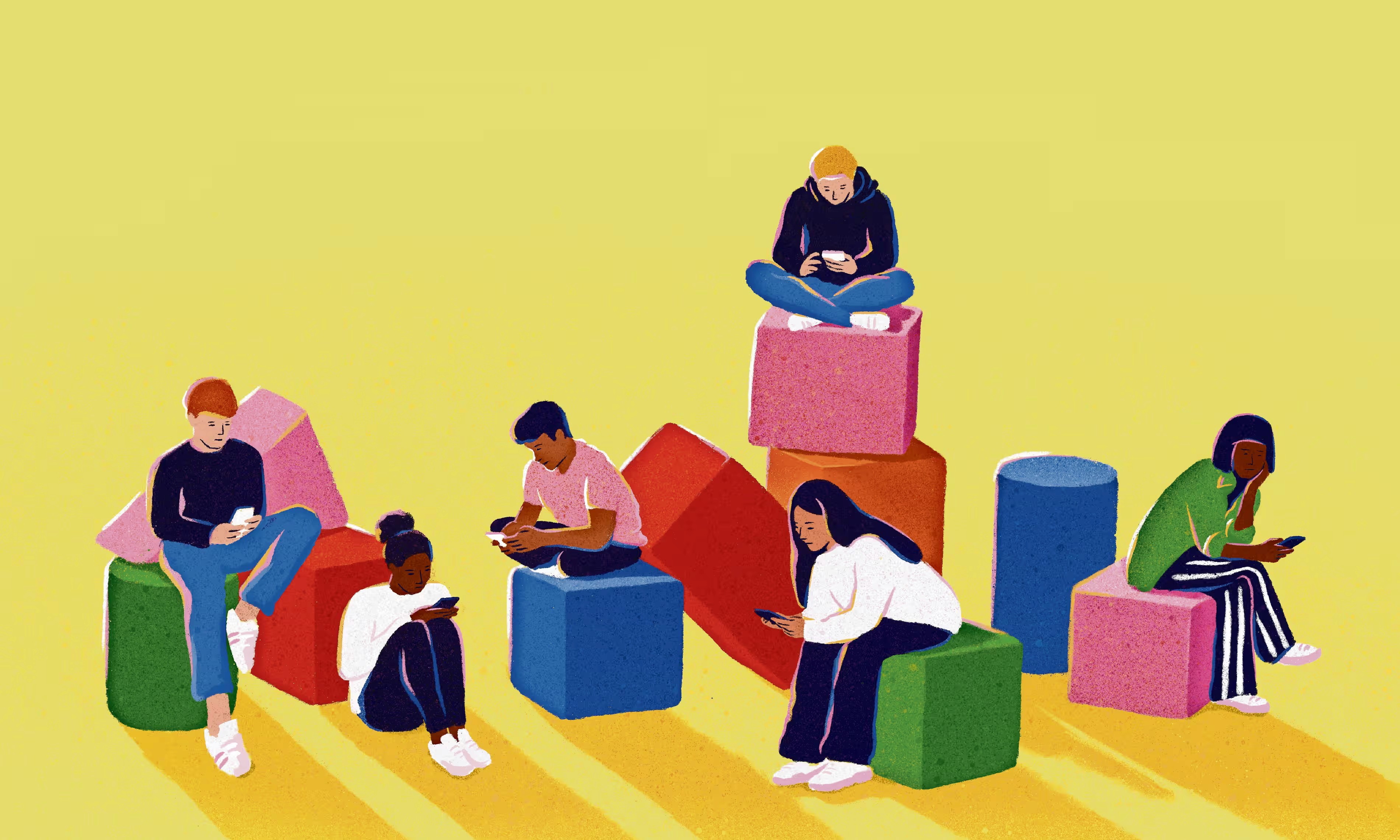Tech-Induced Anxiety: Is Our Digital World Making Us More Anxious?
With digital reliance rising, tech-induced anxiety is affecting Gen Z, Millennials, and Gen Alpha. This blog explores how tech impacts mental health, focusing on recent studies from India.
In today's fast-paced, hyperconnected world, technology has become an essential part of life, especially for Gen Z, Millennials, and Gen Alpha. We rely on our smartphones, social media, and digital platforms for nearly everything—communication, work, entertainment, and learning. While these tools have transformed our lives for the better, there's a growing concern about how our increased reliance on technology may be contributing to anxiety, particularly among younger generations in India.
Technology’s impact on mental health is no longer a subject of speculation but a topic of serious research. In this blog, we’ll explore how the digital world is affecting anxiety levels and what recent studies, particularly from India, have uncovered about the phenomenon of "tech-induced anxiety."
The Rise of Tech-Induced Anxiety
India has seen a rapid rise in internet usage, with over 700 million internet users as of 2023. The Internet and Mobile Association of India (IAMAI) reported that smartphone penetration in urban India is around 90%, and rural areas are quickly catching up. With so many people constantly connected, it's no surprise that this tech saturation has started to affect mental health.
Recent studies in India have started drawing attention to the connection between tech use and anxiety. According to a study published in the Indian Journal of Psychiatry (2020), the excessive use of smartphones and social media was found to significantly correlate with symptoms of anxiety, especially among younger users. The study surveyed over 500 college students across several states and found that those who spent more than three hours a day on their phones were more likely to report feelings of restlessness, worry, and difficulty concentrating.
Social Media and the Pressure to Always Be “On”
For Gen Z and Millennials in India, social media platforms like Instagram, TikTok, and Snapchat are integral to daily life. While these platforms offer spaces to connect, share, and entertain, they also foster an environment where comparison and social pressures thrive. The curated nature of social media—where users present idealized versions of their lives—creates a skewed reality that can lead to feelings of inadequacy and heightened anxiety.
The FOMO Phenomenon (Fear of Missing Out)
The fear of missing out (FOMO) has been particularly noted as a contributing factor to anxiety among social media users. A study conducted by the National Institute of Mental Health and Neurosciences (NIMHANS) in Bangalore found that social media-induced FOMO was directly related to higher levels of anxiety and depression in Indian adolescents and young adults. The researchers found that constant exposure to others’ social activities and successes created feelings of isolation, loneliness, and a sense of inadequacy, even among those who were otherwise socially active in the real world.
According to Dr. Avinash Desousa, a Mumbai-based psychiatrist and researcher, “Social media has created an environment where users, particularly young people, feel the need to constantly showcase their achievements and appear successful. This pressure to be ‘always on’ and present the perfect version of oneself contributes significantly to rising anxiety levels, especially among Gen Z.”
Information Overload and Its Impact on Mental Health
The rapid pace at which information flows in the digital age is another major factor contributing to tech-induced anxiety. Whether it’s breaking news, notifications, or constant updates from various social media platforms, our brains are bombarded with more information than they can process.
Information Overload and Anxiety
A study published by Indian Psychological Science Review (2021) examined the relationship between excessive digital consumption and anxiety among young professionals and students in India. The study revealed that information overload led to decision fatigue, mental exhaustion, and elevated stress levels, all of which are contributors to anxiety. The researchers concluded that constantly feeling the need to keep up with news, trends, and social media updates has become overwhelming for many, leaving little room for mental rest and reflection.
For many Millennials and Gen Z individuals in India, there is a societal expectation to stay informed and engaged. As a result, many young people find themselves compulsively checking their phones, fearful of missing important updates or opportunities. This constant mental stimulation can lead to an inability to relax, causing heightened levels of anxiety.
The “Always-On” Culture: A Recipe for Anxiety
One of the most significant changes technology has brought is the creation of an “always-on” culture. Smartphones, emails, and instant messaging apps have blurred the boundaries between work, school, and personal life, making it increasingly difficult for people to disconnect and recharge.
The Impact on Indian Professionals
A study conducted by The Associated Chambers of Commerce and Industry of India (ASSOCHAM) found that 42% of Indian professionals, particularly Millennials, reported experiencing tech-induced stress and anxiety due to the expectation of being available for work or social interactions around the clock. This constant connectivity has led to burnout, sleep disturbances, and difficulty in maintaining a work-life balance.
Indian psychologist Dr. Samir Parikh, in his research on mental health in the workplace, noted that the “always-on” culture is particularly detrimental to Millennials and Gen Z, who are in the early stages of their careers. The pressure to respond immediately to work emails or stay engaged on social platforms can be overwhelming, leading to anxiety and a diminished sense of personal well-being.
The Role of Social Validation and Dopamine in Tech-Induced Anxiety
Social media platforms are designed to keep users engaged by providing immediate feedback through likes, comments, and shares. This instant gratification is linked to the release of dopamine, the brain’s feel-good neurotransmitter. While this feedback loop can create a sense of happiness in the short term, it can also lead to dependency, creating a cycle of anxiety when users don’t receive the validation they expect.
Dopamine and Social Media Dependency
Research conducted at Sanjay Gandhi Postgraduate Institute of Medical Sciences in Lucknow explored the relationship between dopamine, social media use, and anxiety among teenagers in India. The study found that individuals who received more positive feedback on their social media posts experienced short-term boosts in mood, but those who received less validation reported increased levels of anxiety and a sense of rejection. This dependency on social media validation has been particularly harmful to the mental health of Gen Z and Gen Alpha, who often tie their self-worth to the feedback they receive online.
The addictive nature of social media and the constant need for external validation creates a vicious cycle, where anxiety increases as users become more dependent on positive feedback to feel good about themselves.
Digital Detox: A Solution to Tech-Induced Anxiety?
Given the growing concern around tech-induced anxiety, many mental health professionals in India are advocating for digital detoxes as a way to combat the negative effects of technology overuse. Digital detoxes involve taking intentional breaks from screens, social media, and constant connectivity to allow the mind to rest and recover.
The Benefits of Digital Detoxes in India
A study by Amity University in Noida found that students who participated in digital detox programs for a week reported lower levels of anxiety, better sleep, and improved focus. The study suggested that regular breaks from technology could help individuals manage their mental health and reduce the risk of tech-induced anxiety.
Similarly, initiatives like “No Gadget Days” are being promoted in schools and workplaces across India, encouraging students and employees to disconnect from their devices and engage in face-to-face interactions. These initiatives have been found to improve mood, reduce anxiety, and foster stronger interpersonal relationships.
How to Manage Tech-Induced Anxiety
While technology isn’t going away, there are several strategies that can help reduce tech-induced anxiety:
Set Boundaries
Establish clear boundaries around your tech usage. Avoid checking your phone or email after certain hours, and designate tech-free zones in your home.Limit Social Media Time
Use screen time apps to monitor and limit the amount of time you spend on social media platforms each day.Practice Mindfulness
Mindfulness practices like meditation or yoga can help you become more aware of your tech habits and reduce anxiety.Take Regular Digital Detoxes
Plan regular breaks from technology to recharge your mental health and reduce the cognitive overload that comes with constant connectivity.
Conclusion
Tech-induced anxiety is a growing issue in India, especially among Gen Z, Millennials, and Gen Alpha. The constant connectivity, pressure for social validation, and information overload have all contributed to rising levels of anxiety in these generations. However, by setting boundaries and embracing digital detoxes, it is possible to mitigate the negative effects of technology and maintain a healthy relationship with our digital world.

